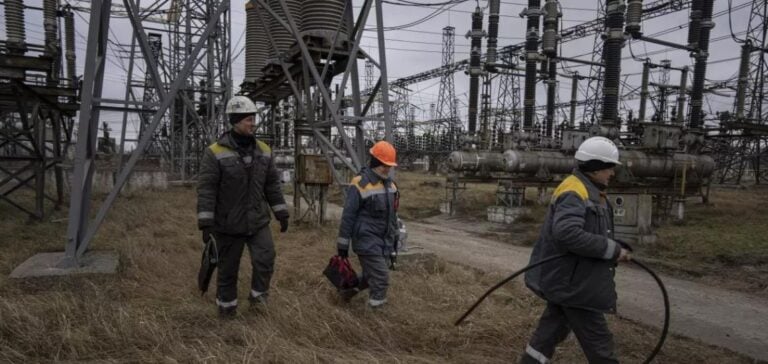Faced with the continuing threat of Russian strikes on its energy infrastructure, Ukraine is stepping up its preparations to secure its facilities ahead of winter.
Prime Minister Denys Chmygal recently announced that Russian plans were specifically aimed at destroying Ukraine’s power grids, prompting Kiev to adopt a heightened defense strategy.
The majority of essential power installations are now protected by two levels of defense consisting of sandbags and reinforced concrete structures, capable of withstanding drone strikes.
This securing of infrastructures is aimed at minimizing the risk of power cuts, which have been affecting the population and essential services for over two years.
Schools and hospitals, considered priorities, are already largely equipped with generators to compensate for power interruptions.
However, the Ukrainian authorities stress the urgent need for an additional 1,800 high-capacity generators to guarantee a stable and secure supply.
Calls for International Assistance and Logistics
Ukraine insists on the need to reinforce its anti-aircraft defense capability, and repeatedly requests assistance from its Western partners.
Last June, Volodymyr Zelensky pointed out that almost half of the country’s energy capacity had been destroyed by Moscow’s intensive strike campaigns.
This situation calls for substantial investment not only to repair damaged infrastructure, but also to strengthen the resilience of the power grid in the face of future attacks.
The Ukrainian government considers international support in terms of funding and equipment to be crucial to the survival of its energy sector.
The challenge is not just to rebuild, but to improve the infrastructure’s resistance to further attacks.
Efforts include not only defensive measures, but also strategies to ensure a continuous and reliable energy supply.
Strategic Challenges and Resilience Perspectives
Strengthening Ukraine’s energy infrastructure is part of a broader context of resilience to external aggression.
Ukraine’s strategy is based on a combination of physical defenses and international alliances.
However, these efforts face significant challenges, particularly in terms of financing and logistics.
The call for assistance in acquiring high-capacity generators highlights the constraints facing the country.
Ukraine must also manage the constraints of a partially destroyed infrastructure while maintaining a sufficient level of production to meet domestic demand.
The ability to protect against further attacks while rebuilding efficiently is at the heart of current concerns.
This complex dynamic requires close cooperation with international partners to overcome financial and logistical challenges.
The situation remains tense, and the future of Ukraine’s energy sector will largely depend on the country’s ability to coordinate its defense and reconstruction efforts with international support.
The decisions taken today will have long-term implications for Ukraine’s energy stability and resilience to future threats.






















